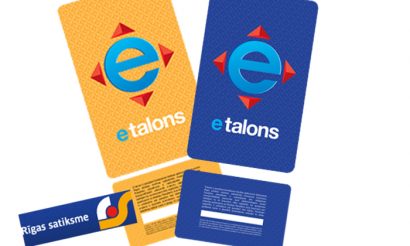Payment Technology: Part Two
- Like
- Digg
- Del
- Tumblr
- VKontakte
- Buffer
- Love This
- Odnoklassniki
- Meneame
- Blogger
- Amazon
- Yahoo Mail
- Gmail
- AOL
- Newsvine
- HackerNews
- Evernote
- MySpace
- Mail.ru
- Viadeo
- Line
- Comments
- Yummly
- SMS
- Viber
- Telegram
- Subscribe
- Skype
- Facebook Messenger
- Kakao
- LiveJournal
- Yammer
- Edgar
- Fintel
- Mix
- Instapaper
- Copy Link
Posted: 26 April 2017 | Graham Ellis | No comments yet
Graham discusses how Latvia is offering passengers varied and flexible travel payment solutions in part two of his payment technology series…
Last week Graham Ellis shed light on some of the payment technologies currently being utilised in the UK. In this second part of the story, Graham discusses how Latvia is offering passengers varied and flexible travel payment solutions…
There are some operators throughout mainland Europe that have moved entirely to smartcards. The city of Riga in Latvia is home to one such example; the local operator, Rīgas satiksme, has moved almost exclusively to plastic smartcards that can be easily recharged or upgraded at very little cost.
Rīgas satiksme


Rīgas satiksme was founded on 20 February 2003 as a Riga municipal limited liability company and it also owns capital shares in the following companies with share capital: SIA Rīgas karte (51%), SIA Rīgas acs (100%) and SIA, Centra termināls (17.29%).
At present the company employs about 4,300 people and provides nine tram routes, 19 trolleybus routes and 55 bus routes.
The combined system operates around 45 million kilometres, carries nearly 150 million passengers per year, and manages over 5,000 parking lots in Riga and Vecāķi.
Electronic ticketing
The Riga e-ticket is a universal electronic ticket enabling the use of the most up-to-date and convenient means of payment for public transport services. They were fully introduced on 1 May 2009 and are valid across all of Rīgas satiksme’s public transport vehicles.
Riga e-tickets come in two forms. The first is the ‘yellow’ e-ticket with the following properties:
- It is made of cardboard and has an electronic chip
- Includes time tickets, group tickets and tickets for a certain number of trips
- Can be bought in ticket vending machines, kiosks of ‘Narvesen’, ‘Latvia Post’ offices in Riga and Rīgas satiksme ticket trade outlets
- Is convenient for passengers who do not use Riga public transport on a regular basis, including Riga guests
- Can be used within 12 months from the moment of purchase, except when the tariff of the ticket type changes or the ticket type is cancelled and Rīgas satiksme sets a transition period for the validity of the ticket type
- Cannot be folded, pressed, broken, crumpled, soaked or subjected to any other impact that renders it invalid for use
- Is designed to register one person’s trip. If a ticket for several persons is necessary, then a group ticket for two or three persons can be bought.
The second is the ‘blue’ e-ticket with the following properties:
- It’s made of plastic
- Is valid for 10 years (though e-tickets issued before July 2013 are valid for five years). Passengers have the option to check the validity of non-personalised e-tickets in the e-shop or in card print-outs, which are available at Rīgas satiksme customer service centres and ticket outlets
- Does not include personal data and can be used by several persons
- Is available in Rīgas satiksme ticket trade outlets only (client service centres and at the end stop of a route). When buying a blue non-personalised e-ticket, a customer pays a deposit of €2.85, which is repaid if the ticket is returned to the Rīgas satiksme customer service centre in a technically sound and usable condition during six months after its validity period
- Is necessary for those who use public transport on a regular basis and do not want to use a personalised e-ticket
- Cannot be blocked and restored if lost
- Can be reloaded in ticket vending machines, kiosks of ‘Narvesen’, ‘Latvia Post’ offices in Riga and ticket trade outlets of Rīgas satiksme
- Is designed for loading one-month tickets and tickets for a certain number of trips
- Are to be used within 12 months from the moment of purchase, except when the tariff of the ticket type changes or the ticket type is cancelled and Rīgas satiksme sets a transition period for the validity of the ticket type
- Cannot be folded, pressed, broken, crumpled, soaked or subjected to any other impact that makes them invalid for use.
Electronic tickets allow passengers to save time buying tickets, solves the problem of the availability of paper tickets in retail trade, and requires no cash. A ticket loaded to an e-ticket is valid for 12 months from the moment of its purchase, except when the tariff of the ticket type changes or the ticket type is cancelled and Riga’s municipal company, Rīgas satiksme, sets a transition period for the validity of the ticket type.
The implementation of this new system did not lead to tariff changes, and passengers entitled to fare discounts according to Riga City Council regulations can still enjoy these discounts. Only the means of payment changed.
Visitors to Riga have to buy the ‘yellow’ ticket from a vending machine at the airport to access the public transport system into the city centre. They have not yet embraced the mobile ticketing system, but it can only be a short time before they do…
Related topics
Business Models, Fleet Management & Maintenance, Multimodality, Ticketing & Payments, Transport Governance & Policy
Related cities
Latvia








